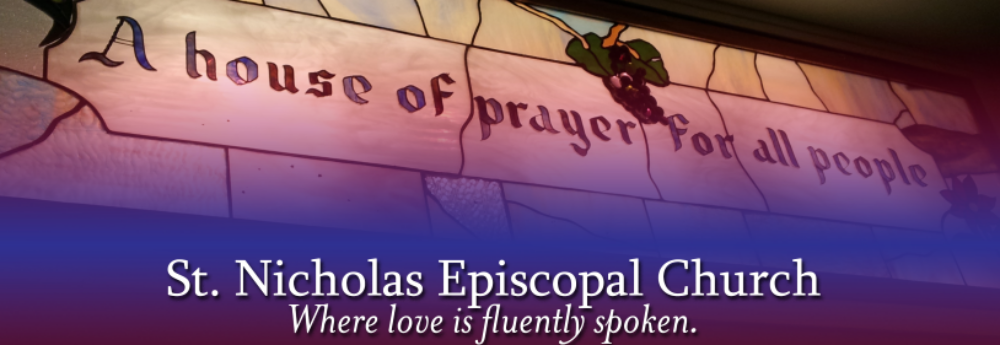Our two churches together make up a community of about the number of people who attend St Alban’s, Monroe LA. We may sometimes think that we’re too small to make a difference, or that we can’t afford to do very much. As you’ll see from the following story, it doesn’t take much to make a world of difference, and achieve so much with very little.
[Episcopal News Service] St. Alban’s Episcopal Church in Monroe, Louisiana, knows what it means to be under water. The spring rains of 1991 flooded the parish’s low-lying neighborhood and ruined the brand-new parish hall. Since then the parish has often sheltered people looking for a place to get out of the way of storms in its rebuilt parish hall and it was no different after Hurricane Katrina.
This time, however, the decision to take in evacuees was in the hands of Senior Warden Reese Little. St. Alban’s, which has an average Sunday attendance of 80 people, has been without a rector for two years. He and his wife Dewana knew on Saturday, August 27, that the hurricane headed for Louisiana was going to be bad.
“We decided we needed to do this again,” Little said.
They began putting the wheels in motion. He printed up flyers and sent his two children to distribute them to the desk clerks as Monroe hotels. As evacuees arrived in town and began to search for rooms, some found hotels full. Desk clerks then passed them the word about St. Alban’s. At the height of their sheltering effort, 43 evacuees were living in the parish hall.
Little admits being a bit worried about how his fellow parishioners would react. “But they were all there, day and night,” he said. Some parishioners who had not been around much in the last two years showed up and worked alongside everyone else.
“We had a lot of support from other churches,” Little added.
Help came from the community as well. A real-estate agent with no connection with St. Alban’s as far as Little knows called one day to ask if they had lunch covered for that day. When she was told they did not, the agent called a caterer and had lunch sent in. A local country club did the same on another day. The night shift at a nearby factory that makes light bulbs for General Motors vehicles made barbecue for the evacuees.
A Red Cross representative came looking for the St. Alban’s shelter one day and got lost. She stopped at Tommy Smith’s house for directions. She was actually about two blocks from the church so Smith took her there. Little said that when Smith saw evacuees sleeping in the parish hall, he came back later with passes to the Monroe Athletic Club which he owns. He told Little that evacuees were welcome to come over to shower, swim, work out and watch television. Many evacuees went to the club especially to watch CNN for its hurricane coverage. Little said the Parish Hall doesn’t have cable. “All we had was ‘rabbit ears,'” he said.
The evacuees were a diverse crowd that included Christians, Muslims, a Jewish man and people of all ages. The parish hosted three baby showers for evacuees, two for mothers with nearly newborns and one for a young woman about to give birth.
Some people had resources to get back on their feet and did so. However, parishioners have raised $20,000 to help the others. They helped rent seven or eight homes, according to Little, paying rental and utility security deposits and first month’s rent. If people need a second month, Little said, the money will be there.
The last evacuees left St. Alban’s on September 6, according to the Rev. Terry Pannell, the parish’s supply priest. Pannell said he learned a lot from watching St. Alban’s parishioners in the last two and a half weeks. “They showed me what it means to really come together as a ministering community,” he said.
Little said the relief effort “really pulled our congregation together.” There have been heartbreaks and hard work along the way, he said. One day his wife took a phone call from a family looking for shelter. She thought they couldn’t take in anyone else. “She was trying hard to say no,” Little said.
But she listened to this mother’s story and she told her to come. The mother had a baby who is on a heart monitor and their alternative was to live in the back seat of their car, Little said. Dewana Little stood up a recent service at St. Alban’s and told the congregation “don’t ever say no.” Pointing to the mother and her baby, she said, “this is who I almost said ‘no’ to.”
She thanked the evacuees. “You all have done so much more for us than we have done for you,” Little reported his wife as saying.
Little said the parish is energized by its hurricane-relief work and hopes to capitalize on the renewed interest he senses in the parish. He wants the parish to develop a disaster plan and buy supplies so that parishioners are ready to go for the next group of evacuees because he knows “we’re going to do it again.”
— The Rev. Mary Frances Schjonberg is national correspondent for the Episcopal News Service.
